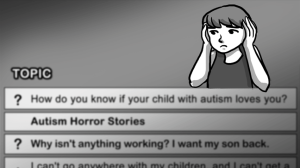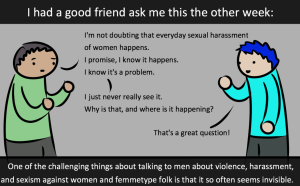I’m a college professor who loves teaching first-year students.
Something like 80% of my course load is made up of first-year composition and orientation courses. Even though sophomores, juniors, and seniors tend to be more at ease in an academic setting, more inclined to actually doing the readings I assign, and more confident in following my instructions, there’s something special about being a part of the earliest days of a student’s years in college.
First-years can be nervous, but they’re also willing to take risks. They don’t necessarily know what to expect from a collegiate classroom setting, so they can be more willing to accept unconventional ideas and strategies.
I also love that first-years are new to the kind of critical thinking that college requires, and I get to watch them develop in what, for many, is their first experience being challenged in their beliefs and values.
So, first-years are great.
You know what first-years often times aren’t? Feminists.
I hate to admit it, but I don’t get a lot of students who identify as feminists from the moment they walk onto campus for their first year.
I have many upper-level students who call themselves feminists by the time they’ve been taking classes for a few semesters, but first-year students aren’t so quick to claim the title, or any other comparable word that shows that they recognize that there are systematic injustices in the world that need to be addressed and remedied.
Even when they identify as feminists, sometimes they don’t want to say so in class, because they worry about other students’ misconceptions about the label and its connotations.
All this means that when I get a first-year who says, “Yep, I’m a feminist,” I get really excited. I look forward to that student’s contributions to class, and sometimes I even try to take them under my wing a bit and make sure they can connect with other people on campus who are concerned about intersectionality and feminism.
I’ve been thinking lately about the plight of feminist first-years.
They’re often surrounded by people who are antagonistic toward their beliefs, or what people think they believe based on a misunderstanding of the concept. (Feminists hate men! Feminists are always playing the victim card! Feminists don’t believe in personal responsibility! Feminists hate babies!) Even these critical, misinformed students are often on the path to feminism themselves; they’re just becoming aware of society’s injustices and inequalities for the first time.
What’s the feminist first-year to do while they wait for – and probably encourage! – their peers to get on board?
As a person who is fluent in the language of the undergraduate college, here are the tips I’d offer to anyone entering college as a feminist. These tips can help you survive in what can feel like a sea of anti-equality rhetoric from your peers, make sure your college safer for all women (including women of color and trans women!) and other gender minorities, and guarantee that your campus becomes a more inclusive environment.
1. Remember: Some of Your Peers Are Being Challenged to Think Outside of Their Personal Experiences for the First Time
If you can keep that in mind, you can survive some of those painful moments when your fellow first-year student say things like “Racism is basically over” and “Men suffer, too” and “All lives matter” and “Not all men.”
You should challenge these tropes when you hear them, but keep in mind that you might be the first person to do so.
Sometimes it takes several times of encountering a new idea before a person can understand it as true, so think of yourself as the person who is laying the groundwork for your peers’ later enlightenment.
2. You Will Know More Than Some of Your Professors About Feminism and Intersectionality
You will also know less than some of them. You can’t necessarily tell right away which is which.
Don’t assume you know more than your teachers do about issues of injustice and inequality.
I learned some of my earliest lessons in feminism from a straight, cisgender, Christian, white man who taught history at my alma mater. If I had written him off because I didn’t think he was someone who would know anything about feminism, I would have missed out on a great chance to learn some of the basics of feminist theory.
At the same time, I’ve heard women professors sex-shame suicide victims and dismiss the notion that trans issues are important.
You just don’t know going into a classroom whether the instructor is going to be antagonistic toward your beliefs or enthusiastic. Be prepared for either.
3. Find Other Feminists
Most campuses have clubs or student groups that you can join.
Get involved as a first-year, and you have a great chance of not just building relationships with other like-minded people, but also gaining important leadership experience by the time you graduate.
4. Check Your Campus’ History with Title IX
If your school has a problematic history with this law, which effectively bans gender-based discrimination and is supposed to ensure that students are safe from sexual assault, then ask yourself how you can challenge that history.
Should you write of your concerns to the administration? Pen a letter for the school newspaper? Organize an educational event?
f you find that there is not a good policy in place to help your school abide by Title IX, find out who on the faculty you need to go to in order to help create that policy.
Be willing to contribute to the solution.
Keep in mind that there should be a specific person on the campus whose job is to maintain Title IX compliance; it would be great to track down that person.
5. Find Educational Events on Campus That Raise Awareness About Inequality
What if you and your friends put together a Body Acceptance Week, or looked into Take Back the Night, or partnered with a campus group to show a movie like Miss Representation?
Or could you start a feminist book club, do a demonstration, or host a panel discussion of faculty?
Do you need to raise awareness of racist, sexist, transphobic, or homophobic policies that exist in your campus community?
Consider what groups on campus you can partner with to raise awareness of inequality in your community.
6. Don’t Wait to Get Involved
There’s a lot to do your first year. It’s true.
You’re adjusting to a new way of life, and it can be easy to think, “I’ll get involved in feminist causes next year.” And I get why you’d want to wait.
I just can’t emphasize enough, though, that four years is a really short amount of time.
If you are a traditional student with a four-year graduation trajectory, you’re going to be off this campus in no time. I recommend getting involved as soon as possible!
7. When Your Professor Assigns a Text by a Writer Who Isn’t a Straight, White, Cisgender Man, Read It
You’re going to be tempted, from time to time, not to do your readings.
You might not realize that many professors watch for student engagement when deciding on their syllabus readings.
You can send a message to professors who are diversity-minded (and even those who are not) by being especially engaged when the readings and course materials are not written by society’s most privileged.
8. Speak Up in Class
And especially speak up if a conversation about non-privileged groups is being dominated by those in positions of social privilege.
There is an important refrain in feminism that says that people who are part of non-privileged groups are not responsible for educating those who are ignorant. That’s definitely true, and I don’t want to reduce the importance of that statement.
However, I also challenge you to look at the social context of your role as a student.
As colleges continue to emphasize on collaborative learning, your role as student isn’t just to be a passive collector of information. You are contributing to the learning experience.
When you can, contribute by speaking up and challenging social oppression when you see it. And of course, if you yourself are the privileged person in the conversation, be quiet and listen instead of feeling like you have to have your say.
9. Educate Yourself as Much as Possible on Intersectional Feminist Issues
Read. Go to campus events to hear speakers talk about intersectional issues like racism, poverty, disability issues, and gender-based oppression. Volunteer. Make sure you’re never the smartest person in your social circle. Travel domestically or abroad with your university’s international studies or service organization.
Read. Not just the Internet (although that’s a great starting place), but also books. A great place to start is look up what books have influenced your favorite online feminists. Don’t forget to spend time with ideas you disagree with, too!
Ask questions.
Make sure you’re never the smartest person in your social circle.
Did I mention the importance of reading?
10. There Is No ‘Right Way’ to Be a Feminist, and There Is No ‘Right’ College Experience
However, I hope first-year feminists can look at this list and figure out what they can apply to their own university and life experiences.
Have a great first year!
[do_widget id=’text-101′]
Liz Boltz Ranfeld is a writer and English teacher in Central Indiana. She teaches English composition and creative writing at a small Christian liberal arts university, and writes nonfiction. In 2011, she graduated from the University of New Hampshire’s Creative Nonfiction MFA program. Her thesis was a memoir about the ethical and moral implications of sending teenage Christians abroad to save the world for God. She blogs weekly on her website and you can follower her on Twitter @LizBR.
Search our 3000+ articles!
Read our articles about:
Our online racial justice training
Used by hundreds of universities, non-profits, and businesses.
Click to learn more





















